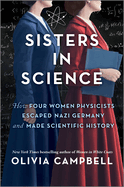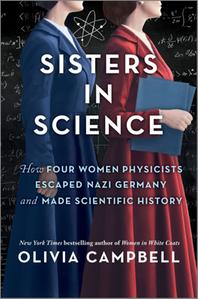
 Einstein, Bohr, Planck: these scientists' names have become synonymous with groundbreaking innovation and genius. Less well known, through no fault of their own, are the names Lise Meitner, Hedwig Kohn, Hertha Sponer, and Hildegard Stücklen, whose efforts made them "the first generation of women physicists" in Germany. Thanks to the efforts of Olivia Campbell (Women in White Coats) in Sisters in Science, the struggles that these women faced to establish their careers in the face of hostile misogyny, and then to reestablish them after having to flee Nazi Germany, will be better known.
Einstein, Bohr, Planck: these scientists' names have become synonymous with groundbreaking innovation and genius. Less well known, through no fault of their own, are the names Lise Meitner, Hedwig Kohn, Hertha Sponer, and Hildegard Stücklen, whose efforts made them "the first generation of women physicists" in Germany. Thanks to the efforts of Olivia Campbell (Women in White Coats) in Sisters in Science, the struggles that these women faced to establish their careers in the face of hostile misogyny, and then to reestablish them after having to flee Nazi Germany, will be better known.
Meitner, Kohn, Sponer, and Stücklen contributed to major advancements in physics despite facing roadblocks to their initial educations. For example, Kohn authored a radiometry textbook relied upon for decades, and Sponer became the first woman hired to the Duke physics faculty. This was despite the fact that science education was not seen as a necessity for young women in Germany, even before Nazi policies actively pushed women, and especially Jewish women, as Meitner and Kohn were, out of the laboratories.
Sisters in Science depicts the difficulties these women--and others--overcame to achieve their academic qualifications, to attain the right to teach and earn a living, or even to secure academic or research-based positions in patriarchal Germany, and beyond that, academic institutions around the world. By featuring someone like Meitner, whose post-Germany work led to the discovery of nuclear fission and made a clear impact on the future of science (as well as earning a Nobel Prize for Otto Hahn), Campbell asserts that readers ought to consider the many minds never allowed to reach their full potential. She also points to the all too many scientists and their family members who did not manage to escape Nazi persecution, and details the personal human toll and traumas of trying to survive in an increasingly hostile environment.
Campbell's approachable and engaging narrative explores this moment of history through the personal and academic growth of these four women, and how they were not only companions in scientific endeavors, but the support system for each other as they fought institutional discrimination and fled fascism. Campbell demonstrates "the power of fascism and institutionalized intolerance to rob the world of incredible minds and severely stunt scientific progress." But she also makes clear that "sisterhood and scientific curiosity can transcend borders and persist, flourish even, in the face of seemingly insurmountable odds." Sisters in Science is a necessary narrative that brings readers into the lives and minds of four brilliant women, while calling upon them to think about what might have been had they, and others whose names are not known, were truly celebrated and supported. --Michelle Anya Anjirbag, freelance reviewer
Shelf Talker: Olivia Campbell's exploration of the trials of four women physicists who fled Nazi Germany shines a light on innovators lost to history.

